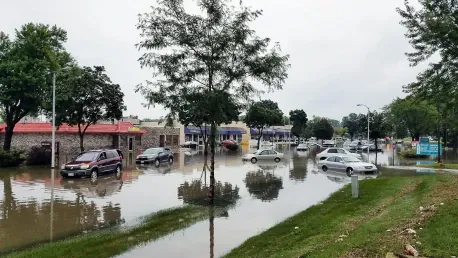Ducks Unlimited Canada (DUC) has embarked on a groundbreaking initiative named Nature Force in Quebec, aimed at addressing the growing flood risks in the Lorette River sub-watershed. The initiative seeks to enhance flood resilience, promote biodiversity, and improve water quality through natural infrastructure solutions. Key backers of this project include Environment and Climate Change Canada’s Nature Smart Climate Solutions Fund (NSCSF), property and casualty insurers, the City of Quebec, and North American entities like Fall Flights, the North American Wetlands Conservation Act (NAWCA), and the U.S. Fish and Wildlife Service. The program is a testament to how integrating ecological preservation with human and commercial interests can create robust flood management systems.
Collaborative efforts between governmental and non-governmental organizations are crucial in fostering this initiative. Minister of Environment and Climate Change, Steven Guilbeault, emphasized the diverse benefits that nature-based solutions offer. These include carbon storage, habitat provision, and pollutant filtration. Melanie Deslongchamps, DUC’s director of provincial operations for Quebec, highlighted the increasing flood risks driven by extreme weather conditions, underscoring the necessity for united efforts in developing effective flood mitigation strategies. This shared perspective points to the rising importance of integrating natural infrastructure to combat climate risks effectively. The approach focuses not just on conservation goals but also on meeting the needs of affected communities for sustainable flood management solutions.
The Science Behind Nature Force
The Nature Force initiative employs hydrogeomorphological principles and advanced hydrological models to guide its restoration projects. These scientific methodologies inform upstream actions designed to prevent downstream flooding. The primary objective is to enhance water retention and mitigate flood severity, crucial services as extreme weather events become more frequent and unpredictable. Restoring wetlands and other aquatic environments upstream serves as the linchpin of this strategy. By enabling these natural landscapes to absorb and retain excess water, the initiative offers a multifaceted approach to balancing ecological preservation with human needs.
Moreover, the scientific grounding of the project ensures that interventions are both effective and sustainable over the long term. These natural infrastructure solutions have the added benefit of boosting biodiversity and contributing to carbon sequestration, which further fortifies the resilience of local ecosystems. The use of advanced hydrological models allows for precise planning and implementation, ensuring that the benefits of restoration projects are maximized. This science-driven approach resonates with the broader objective of harmonizing environmental conservation with practical outcomes that communities can rely on when faced with extreme weather events.
Multi-Faceted Benefits and Community Engagement
Ducks Unlimited Canada (DUC) has launched Nature Force in Quebec to tackle the increasing flood risks in the Lorette River sub-watershed. This initiative aims to boost flood resilience, foster biodiversity, and enhance water quality using natural infrastructure solutions. Major supporters include Environment and Climate Change Canada’s Nature Smart Climate Solutions Fund (NSCSF), property and casualty insurers, the City of Quebec, and North American entities like Fall Flights, the North American Wetlands Conservation Act (NAWCA), and the U.S. Fish and Wildlife Service. The project underscores how ecological preservation can align with human and commercial interests to create effective flood management systems.
Collaboration between governmental and non-governmental organizations is essential for this initiative’s success. Steven Guilbeault, Minister of Environment and Climate Change, highlighted the multiple benefits of nature-based solutions, such as carbon storage, habitat creation, and pollutant filtration. Melanie Deslongchamps, DUC’s director of provincial operations for Quebec, emphasized the increasing flood risks due to extreme weather, stressing the need for coordinated efforts in flood mitigation. This united stance shows the growing importance of integrating natural infrastructure to effectively combat climate risks, addressing both conservation and community needs for sustainable flood management solutions.









